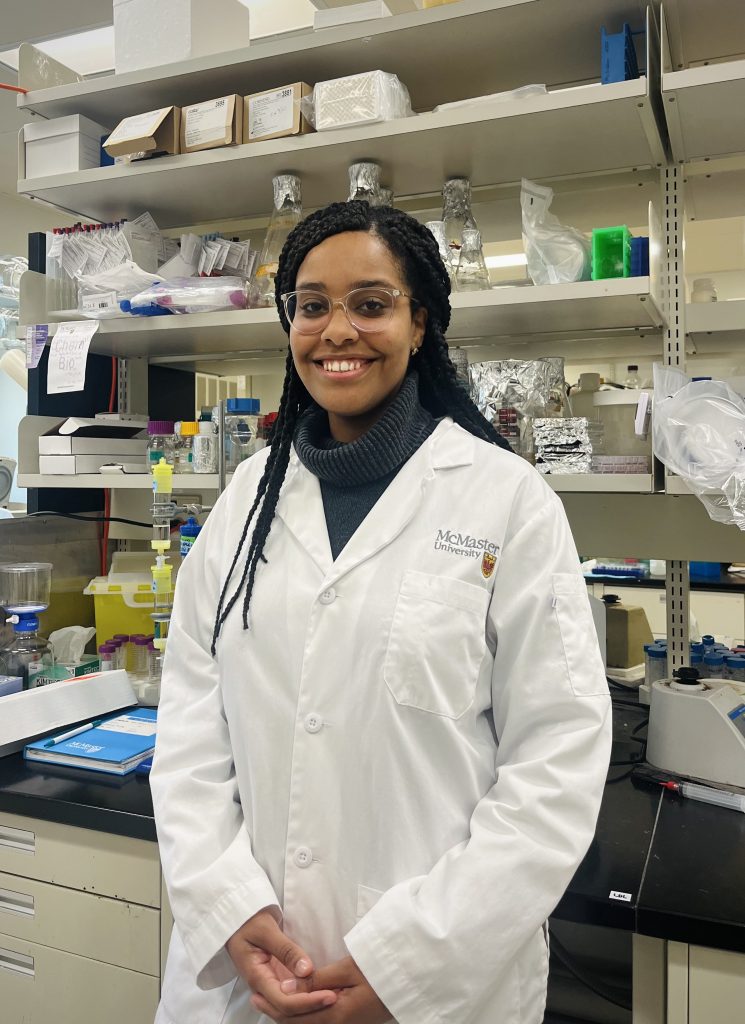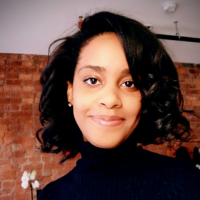2022 MIRA PhD Scholarship recipient Karla Martinez Pomier’s research on the inhibition of toxic metals by human serum albumin was recently published in the journal Chemical Science. This research, supervised by MIRA member Giuseppe Melacini, has implications for understanding the accumulation of amyloid proteins and the mechanism and onset of age-related neurodegenerative disorders including Alzheimer’s and Parkinson’s.
Karla, a PhD trainee in the Department of Chemistry and Chemical Biology, came to McMaster in 2019 as a graduate student. Karla’s academic and personal journey from Cuba to Newfoundland to Hamilton was recently explored in this profile by Jay Robb, originally published in Brighter World.
Award-winning doctoral student finds her second family at Mac
Eight years before she was an award-winning doctoral student, Karla Martinez Pomier was far from home, bone cold and mastering a second language.
Martinez Pomier left Cuba halfway through a biochemistry degree at the University of Havana. The 20-year-old loved the country but couldn’t see much of a future if she stayed.
“It’s hard to live a comfortable life there. And I knew I’d never earn enough money to travel and see the world.”
So she transferred to Memorial University in Newfoundland and moved in with her dad, who had been a doctor in Cuba and now worked as a nurse in St. John’s.
The move to Canada in 2015 was harder than expected. Her dad had given a heads up about Canadian winters, but it was still a drastic change.
“I can’t describe how cold I was.”
The bigger issue was the isolation as people hibernated through the long winter months. Hunkering down at home was doable if you already had lots of family and friends. But Martinez Pomier only had her dad.
“In our culture, family’s involved in everything for better and sometimes for worse. I missed my mom, extended family and friends terribly.”
Martinez Pomier had learned rudimentary English in her science-focused high school, but not enough to follow along in lectures or to hold her own during labs and tutorials.
So before continuing her degree, she signed on for a six-month intensive course where she spent all day every day learning to read, write and speak English. She became an avid reader.
After a rocky start at Memorial, she befriended a classmate who helped her make sense of the university’s unwritten rules.
‘I found a second family here in Hamilton’
Martinez Pomier graduated from Memorial with honours in 2019.
Yet she was still in the dark when it came to graduate school, and had waited too long to apply to many schools, believing you could only apply after you’d completed your undergrad degree.
Her dad suggested she apply to McMaster because of Donna Strickland: A year earlier, the Mac alumna had been awarded the Nobel Prize in Physics with Gérard Mourou.
Martinez Pomier was accepted into the Chemical Biology program as a graduate student and joined professor Giuseppe Melacini’s research group.
She’d never been to McMaster or Hamilton before arriving in the summer 2019, but was pleasantly surprised. “I found a second family in Hamilton. I’m so happy with the friends I’ve made here,” she says.
“It’s such a collegial, friendly and kind environment.”
She also dodged the January 2020 blizzard that dumped 76 centimeters of snow in one day on St. John’s and brought in the Canadian Armed Forces to dig out residents after the record-setting storm.
She wasted no time in getting to work researching the molecular mechanisms that lead to age-related diseases like Alzheimer’s, Parkinson’s and cancer.

Her research has been funded with back-to-back-to-back awards, with a McMaster Institute for Research in Aging PhD Scholarship in 2022 and an NSERC Doctoral Canada Graduate Scholarship in 2023 and the James A. and Irene D. Morrison scholarship in 2024.Unlike her start at Memorial, she never struggled with the unwritten rules of applying for grants and scholarships. Martinez Pomier had her supervisor in her corner, offering advice and support throughout the entire application process.
“I couldn’t have done it without Dr. Melacini’s guidance and support.”
So far, she’s been the lead author on four research papers and a contributor to six others. She’s presented at a half-dozen conferences and volunteered as a chair and judge at an undergrad chemistry conference.
A mentor and role model for international students
Martinez Pomier also works as a biochemistry teaching assistant and makes time to mentor international students who are just settling in and finding their way at Mac.
She can relate to feeling homesick and overwhelmed. Her best advice? “Find one person who can support you and knows what to expect. You’ll eventually figure it out.”
She says everyone, and not just international students, should at some point be a stranger in a strange land.
“Challenge yourself and be uncomfortable. It forces you to learn and adapt. Everyone should go through it. It’s a good experience.”
Martinez Pomier’s excellence as a researcher, teacher and mentor was recognized with the Faculty of Science’s inaugural Graduate Student Black, Indigenous and Latin American / Latinx Award.
The recognition is well-deserved, says assistant professor Rodrigo Narro Perez, who met Martinez Pomier through the Latin American Network at McMaster University.
After watching her connect with other Latin American grad students, he asked her if she’d speak at a Let’s Talk About Race event about her experiences as a Black Latin American student in the sciences.
They’ve been friends ever since.
“What stands out for me is Karla’s determination, attitude and humility. She’s achieved all of the goals that she’s set for herself,” Narro Perez says.
“I’m also impressed by her commitment to help make the Faculty of Science and McMaster an inclusive community. She’s so passionate about encouraging Black high school students to pursue STEM. You couldn’t ask for a better role model.”
So what’s next? Martinez Pomier plans to work in the biochemistry industry after earning her PhD. She’ll continue to search for new treatments and cures. And she’ll take a well-deserved vacation to see the world. Preferably somewhere warm.
